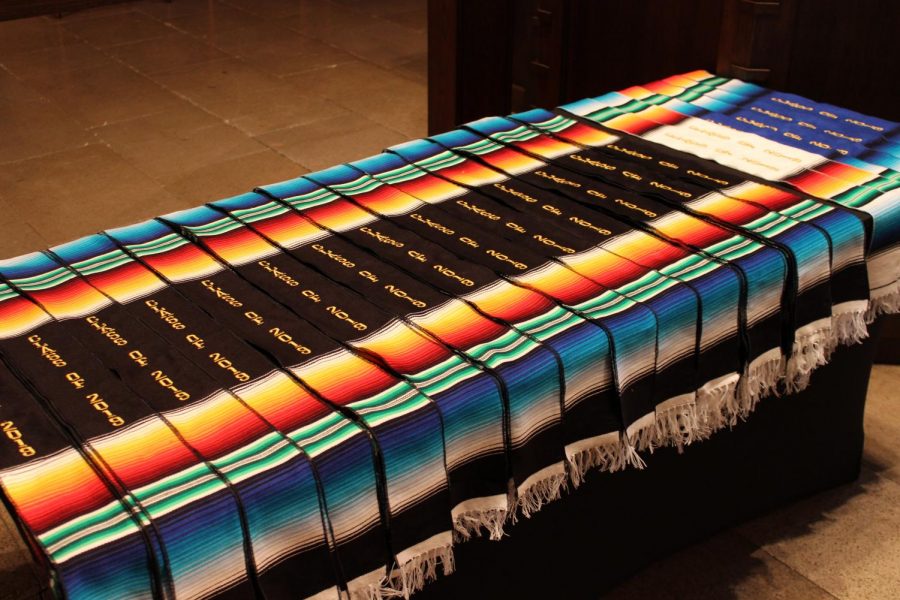Class of 2021 to have in-person commencement
Other ceremonies will be taking place virtually
In an email to Trinity students on March 24, Danny Anderson, president of Trinity University, announced that spring 2021 Commencement would take place in person on Saturday, May 22. The Bachelor of Arts and Bachelor of Music ceremony will be at 8 a.m., the Bachelors of Science ceremony will be at 11 a.m. with both taking place on the football field. The graduate ceremony will be held at 3 p.m. in Laurie Auditorium.
Camille Johnson, senior anthropology major, said she’ll miss places on campus like Storch where she grew close with other anthropology students and faculty.
“There’s the physical anthropology lab downstairs in Storch, and I spent nights there with a blanket doing homework or writing a paper,” Johnson said. “So I think I’m going to miss having that space.”
The opportunity to graduate in person comes as a hopeful announcement as more people get vaccinated and in-person events become more common. However, students and their families still have the option to join the ceremony virtually.
“If you choose not to attend in person, you will still be acknowledged during the conferral of degrees,” Anderson wrote in his email. “Ceremonies will be live-streamed for those unable to attend in person. These plans are subject to change, based on the level of COVID-19 cases at Trinity and within the larger community, and there are many details to come about additional steps we will take to protect the health and safety of participants.”
In addition to this spring’s commencement, graduating seniors from various cultural organizations and departments will hold their own ceremonies.
De Colores
De Colores will be celebrating Latinx and/or Hispanic graduates at 1 p.m. on May 21 via Zoom. There will be a drive-by opportunity for participants in San Antonio to receive some special items and connect with fellow graduates and faculty one last time, but everything will be mailed to participants outside of San Antonio.
“Graduates are gifted a symbolic sarape stole that is colored to represent the many colors of people within Latin America, the many areas we come from and languages we speak, and our many accomplishments,” said Thomás Peña, Trinity University Latino Association president. “With De Colores, participants are reminded not only of their own journey and accomplishments, but also of those who came before them and those for whom you’ve cleared the path for as an underrepresented minority in higher education.”
Lavender Graduation
Lavender Graduation will highlight LGBTQ students in a brief, online gathering where participants will unbox a lavender cord and show off their majors and accomplishments with a slide dedicated to them. This year will be the third iteration of Lavender Graduation, an event originally created in 1995 at the University of Michigan by Ronni Sanlo, a Jewish lesbian who was unable to attend her own children’s graduation because of her sexuality.
“It creates space to acknowledge students’ experiences and students’ accomplishments,” said PRIDE president, Steven Drake. “It allows for space for celebrating, essentially. And, you know, there may be students who have had more challenging experiences at Trinity because of the identities that they hold and the intersections that those identities have. And so I think that space is also a time to say, you know, you did it.”
Kente
Kente is a graduation ceremony that celebrates Black students. This ceremony, where graduates of Black or African descent receive a multicolored stole, originated in Ghana where the weaving of Kente cloths was born.
The Black Student Union and African Student Association are collaborating this year to organize this event. Kirstin Iyare, senior and Black Student Union president, said that although the exact plans for the ceremony are uncertain right now, Kente remains important because of its recognition of Black graduates’ accomplishments in the face of societal obstacles.
“It’s something to be said about graduating just in itself, but it’s more important when you graduate being part of a marginalized group because there were people that didn’t want you to make it or didn’t think that you could make it. And it’s to prove to them, like, ‘I belong here just as much as you do.’”
Department of Sociology and Anthropology
In place of the usual graduation dinner at Jennifer Mathews’ home, the Department of Sociology and Anthropology will be holding a virtual event for students and faculty to reflect together before saying goodbye. Mathews, department chair of Sociology and Anthropology, said this department-specific event helps solidify the relationships made during the graduates’ time in their major before heading out into the world.
“Events like graduation mark major transitions in people’s lives, such as going from being a college student to being a college graduate,” Mathews said. “Although they will experience this transition in the larger graduation ceremony, we pride ourselves on our mentoring relationships with our students and want to personally acknowledge their accomplishment and let them know what they have meant to us.”

I am a senior French and Earth Systems Science double major from St. Louis, MO. When I'm not wearing my EIC hat, I am also a Chapel | Spiritual Life Fellow,...
















